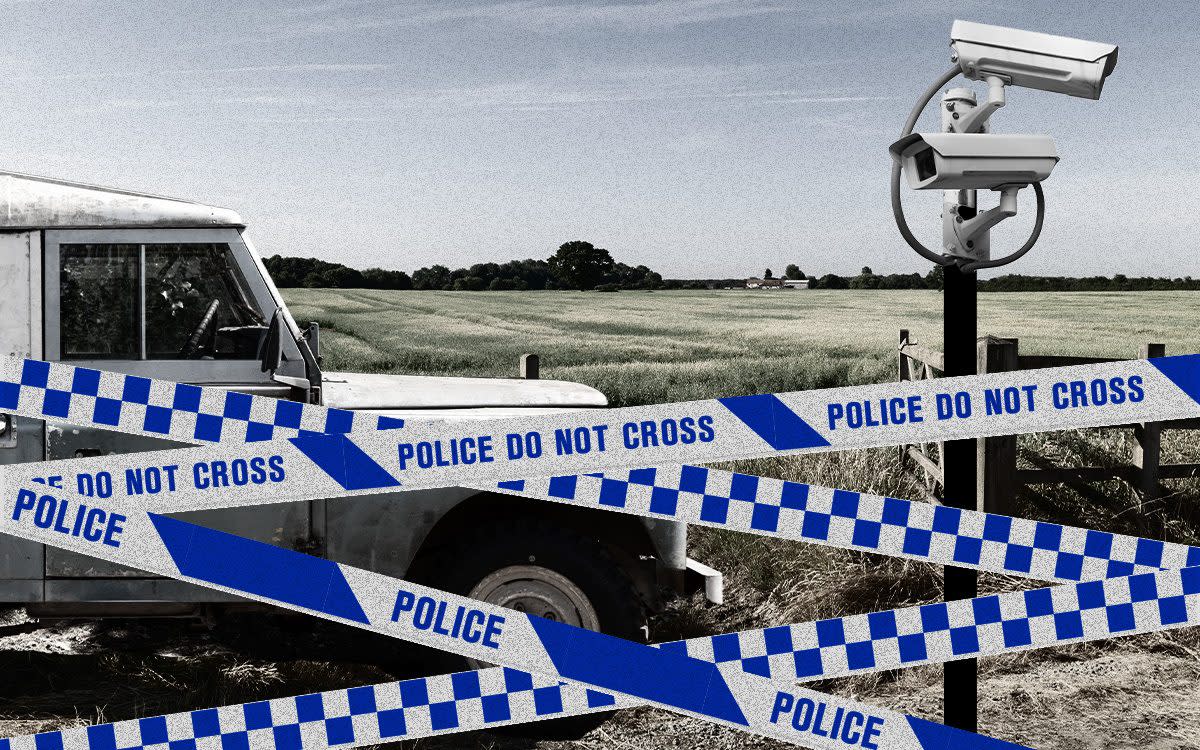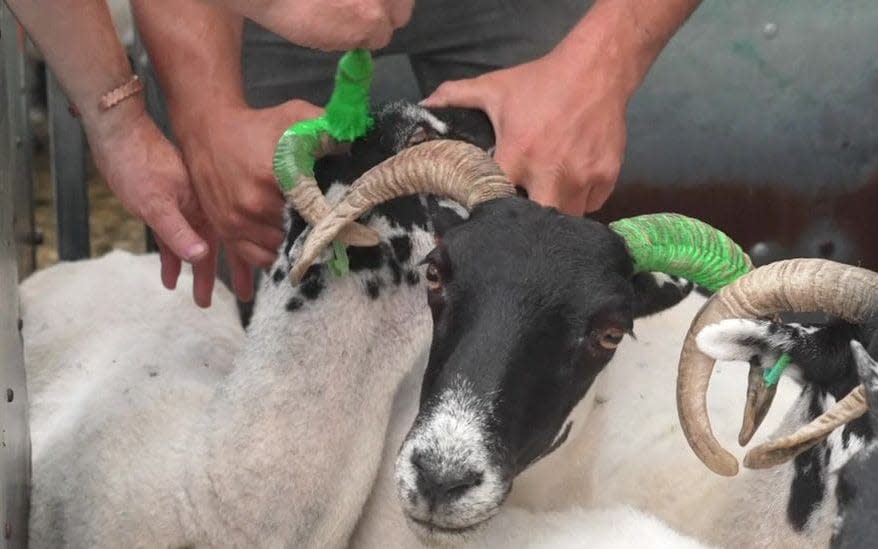Inside the great crime wave sweeping the British countryside

“The thought that there are criminals somewhere on the farm is always worrying away in the back of my mind,” says Luke Palmer as he drives around his family’s 4,000 acres of rich Fenland soil. “It makes you feel as if somebody is always out there watching you.”
The 40-year-old grew up on the farm near Ely in Cambridgeshire in less anxious times. He produces an old red key that used to start all the tractors on the farm. Now there are rise-and-fall barriers on all main entrances to their fields, installed at a cost of close to £100,000 in a determined effort to halt the long list of thefts that have happened of late.
“We’ve had criminal gangs flying drones over the farm to see where the machinery is. They pose as delivery drivers to check us out, or come at night on electric scooters so you can’t hear them.” Recently he and some of his workers were fixing a problem on one side of a combine when a thief snuck up on the other side and tried to make off with its compressor.
That time, they managed to thwart the attempt – and the disruption and delay it would have caused to harvesting. But the threat is always there, Palmer believes, without constant vigilance. “A lorry recently turned up early to pick up a potato crop,” he recalls. “He parked up near the farm and had a rest. When he woke up, someone had drained the diesel from his tank.” The night before we meet, there are reports on a WhatsApp group of local farmers about five stolen GPS systems. These are not bog-standard, car-style TomToms, but sophisticated devices worth more than £5,000 that operate every aspect of tractors and combine harvesters.
Such planned and sustained raids are behind the 40 per cent rise in rural crime in the first three months of this year reported this week by NFU Mutual, insurers to three quarters of the farming community. It comes after two years of falling figures during the Covid lockdown.
The figures are based on claims submitted by farmers to NFU Mutual and reveal a multi-million pound trade in anything – electrical equipment, quad bikes, diesel, fertilisers, chemicals, crops – that is reasonably portable, can be snatched quickly, and has a decent resale value.
Thefts of quad bikes and all-terrain vehicles, for instance, saw NFU Mutual pay out £2.2 million in 2021, with the last quarter of the year accounting for half of that total as the resurgence of rural crime began in earnest. The insurer is also warning about a rise in the theft of livestock – from turkeys to cattle. “There are a lot of hungry mouths at the moment and people struggling with the soaring cost of living,” says Palmer.

What troubles him most is the presence in his area of organised gangs, believed by police to be operating out of Poland or Lithuania. Because East Anglia lies closest to the ports that connect with the Continent, it has been particularly affected. Valuable kit, stolen overnight from farms, can be out of the country in hours.
The NFU Mutual report highlighted some new “hot ticket items” being targeted by gangs. Old Land Rovers, still the indestructible workhorses on many farms, have seen their value soar – both as whole vehicles and broken up into parts – ever since production ended in 2016 and they became trendy “vintage” modes of transport for affluent second-homers.
Matthew Weaver, an arable and dairy farmer in Staffordshire, had his Land Rover Defender stripped of its bonnet and doors earlier this year. “They were brazen and didn’t seem to care that they were in full sight of the CCTV,” he recalls. “I have a high-definition video of the Defender being casually stripped for parts while I slept in the house. They knew exactly how to remove each part so they had clearly planned the job. The same thing happened to others in our area within a day or two of my theft. These parts are being targeted because they are hard to come by at the moment.”
Tony Cable, whose firm rebuilds and refurbishes old Land Rovers in Norfolk, says these parts are so scarce that thieves are selling stolen bonnets online for £600, front doors for £1,500, and “salvaged” seats for £600 to people prepared not to ask too many questions.
Such thefts are particularly frustrating for farmers, like Weaver, who have diligently followed the guidance from police and insurers about security. And, in general, there is widespread disappointment in the lack of back-up and support from the police.
“I went to a meeting of farmers with a senior officer but he could offer no solutions,” says 28-year-old Eveey Hunter, an arable farmer in Hertfordshire who had three GPS systems worth a total of £70,000 stolen last September. “That leaves me worrying about another theft all the time, when there are already so many stresses on the mental health of farmers from Brexit, rising prices and drought.”
No officer attended the crime scene on the day Hunter discovered the theft and none of the stolen goods were recovered. Most farmers say they are simply given a crime number to use with their insurers.
“I once spotted a man I thought was stealing red-handed on the farm and stopped him by raising the barrier gates,” recalls Palmer. “When police arrived, they told me what I did was entrapment. He couldn’t be accused of stealing anything until he’d left the farm. So they let him go.”

Farmers who have confronted gang members have also faced intimidation aimed at silencing them. Some have had burning tyres placed around security devices on the boundaries of their farms. Others point to suspicious wildfires in their stubble fields.
There is an old assumption that countryside areas are safer than towns. Front doors can be left open and cars unlocked. But that is changing, says Dr Kreseda Smith, a lecturer and rural criminologist at Harper Adams University in Shropshire. “People in rural communities tell me they feel like second-class citizens,” she says. “They feel the police no longer protect them and they have to do it for themselves with more locks and security.”
In part, it is the result of cutbacks in police numbers, and the fact that in large, spread-out agricultural counties, with many isolated farms, rural police forces just do not have the manpower or resources required. “Even where there are rural-crime teams, officers are spread thinly over huge areas, with many of the police stations, police houses and local bobbies in small towns and villages now gone,” explains Dr Smith.
And the gangs are well organised. “If you take the theft of livestock as an example” – and this week Dartmoor farmer Neil Cole made national headlines by using irremovable green paint on the horns of his sheep to deter rustling gangs who have been taking 20 to 30 of them each year – “you will need a dog to round them up, a trailer or transporter, somewhere to take them, like a holding pen, and then access to an illegal abattoir if you want to sell the meat into the food chain.”
In response to criticism, police have launched several initiatives including rural crime commissioners in Wales and Northern Ireland, and a dedicated agricultural theft unit at the National Vehicle Crime Intelligence Service (NaVCIS). It saw £2.6 million of stolen farm machinery recovered in 2021, up from £2.3 million the previous year.

DC Chris Piggott specialises in rural crime at NaVCIS. While readily acknowledging the anxiety that it is causing, and the onus on the police to do better, he also treats with a certain caution the reports of a 40 per cent rise in crime in the first three months of 2022.
“That is based on monetary values of claims made, but the cost of everything – tractors, fertiliser, diesel, food – has gone up. So the cost of the same number of claims would also have gone up.” He thinks there has been an increase in rural crime, but not as steep as is being suggested. And he points to recent successes, including the conviction last week in Cheshire of two Lithuanian men who had stolen GPS systems from tractors in February.
He argues, too, that farmers could do more to protect themselves. “Some are doing an excellent job, others not so good. Leaving valuable pieces of removable kit in fields at night is a bit like leaving a £10 note on your doormat. Someone will take it.” Working with NFU Mutual, he has appeared in a series of short films for farmers, re-emphasising basic security precautions.
DC Piggott is also involved in working with European partner forces and with the manufacturers of tractors to disrupt the trade in stolen computer systems by making them more bespoke and pin-code-protected. That way a stolen GPS system cannot simply be plugged into another tractor.
But that is scant comfort for Palmer and his neighbours, who are feeling the emotional impact of the constant vigilance required to keep criminals at bay. “It’s the invasion of our privacy. This is our family home. This” – he gestures to the newly harvested fields on either side of the main gate – “is our front garden. What is being missed is the sheer psychological harm that this crime is doing to us.”

 Yahoo News
Yahoo News 
